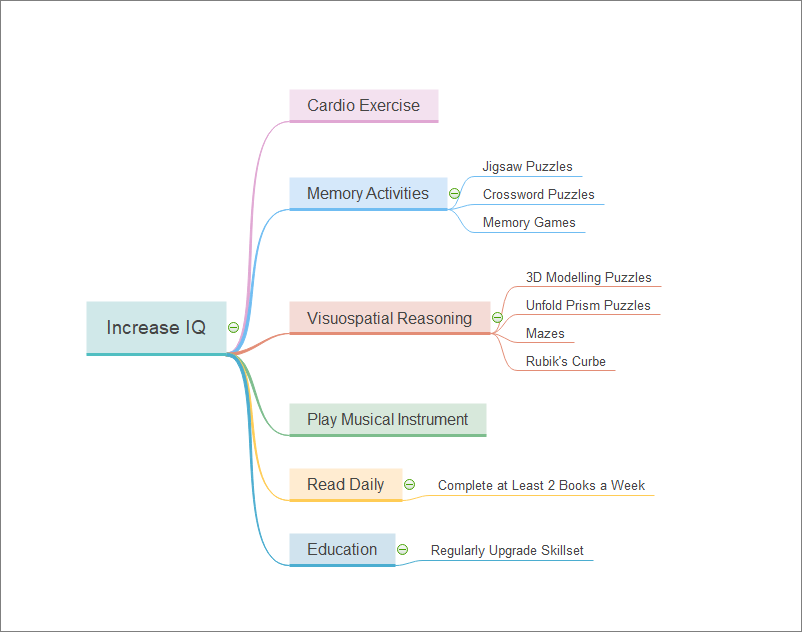How to Increase Your IQ: 6 Simple Practices to Try Everyday
Try Now

Before learning how to increase IQ (Intelligence Quotient), it is essential to understand what IQ is in the first place. Although almost everyone is aware of this term, its specific meaning might still be unclear to most of them. That said, the following sections explain in detail what Intelligence Quotient is, and how to improve IQ using some of the accessible practices that can be exercised at home.
What is Intelligence Quotient (IQ)?
Every human has certain intellectual intelligence. When a person is given a standardized series of quizzes to solve, the range that the individual’s result falls in determines their level of IQ. Although there exist several tests over the world, the most used ones include Wechsler Intelligence Scales. It is categorized into two segments, namely Wechsler Adult Intelligence Scale – Fourth Edition (WAIS-IVIV) for adults (published in the year 2008), and Wechsler Intelligence Scale for Children – Fifth Edition (WISC – V) for the children (published in the year 2014). The following tables explain how a person’s IQ is classified as per Wechsler Intelligence Scales:
| IQ Score Range | IQ Classification |
| 130 or more | Very Superior |
| 120 to 129 | Superior |
| 110 to 119 | High Average |
| 90 to 109 | Average |
| 80 to 89 | Low Average |
| 70 to 79 | Borderline |
| 69 or below | Extremely Low |
As the title suggests and even explained earlier, these scores are not final, and your IQ can be increased if you are willing to do so. The following section explains how to increase intelligence to improve your IQ.
6 Simple Practices to Raise Your IQ
Intelligence Quotient or IQ is directly related to your brain, and the more you sharpen it, the higher IQ you will have. How do you sharpen your mind, you may ask? The answer is, by keeping thinking as much as you possibly can in a healthy manner. Below are a couple of simple practices that would help you increase your IQ level if exercised regularly:
-
IMPORTANT: Since the tips suggested below require daily practices, it is advisable to prepare a mind mapping map using an efficient tool such as EdrawMind that can graphically represent your plans. After preparation, it is imperative to stick to what you have decided in order to improve your IQ in less time.

Source: EdrawMind
Daily Practice 1: Cardio Exercise
It has been scientifically proved that regular exercises are not only good for your health, but they also keep you fresh and mentally relaxed. Since all the toxins are excreted from your body when you sweat, your body is able to breathe in through all its pores. With cardio exercises like running, bicycling, skipping the rope, etc., you breathe in more, and your brain gets more oxygen, thus becoming healthier gradually. With a healthy and fresh mind, your thought processes improve that eventually gives you increased IQ.
Daily Practice 2: Do Memory Activities
As mentioned earlier, the more you use your brain, the higher IQ you will enjoy. There are many ways you can make your brain do memory exercise. Most of them involve solving puzzles. Some proven ones are:
-
Jigsaw Puzzles – Start with the one with a smaller number of pieces, and then progressively increase the challenges as you move forward;
-
Crossword Puzzles – Start with the small and easy ones, and then increase the difficulty level as you proceed;
-
Memory Game – A game where you are required to match the cards after memorizing them.
Daily Practice 3: Visuospatial Reasoning
Visuospatial reasonings force your brain to work on the basis of what you see. When your eyes look at something, they send signals to the brain to process. The more challenging and confusing an object is, the more mental processing is involved in decoding the puzzle. Some useful tools to improve your IQ with visuospatial reasoning include:
- 3D Modelling Puzzles
- Unfolded Prism Puzzles
- Mazes
- Rubik's Cube
Daily Practice 4: Play a Musical Instrument
As it is with the human body, even the mind needs a bit of relaxation, and music dramatically helps in this. In addition, when you learn to play a musical instrument, you memorize the notes and the way your fingers need to be used in a rhythmic manner, which could be a good exercise for your mind. By following this practice on a daily basis would gradually increase your IQ.
Daily Practice 5: Reading Habit
With every book you read, you gulp several new thoughts. In fact, with each page you go through, you walk alongside the author. This habit is living a new life from the writer’s perspective. With the habit of reading something every day, you make your brain accustomed to accepting at least one new thing daily, thus gradually increasing your IQ.
-
Additional Info: It doesn’t matter what you read or who your favorite author is. The idea here is to ensure that reading is a part of your daily routine and not merely a formality that you need to fulfill. Good practice involves reading and completing at least two books in a week to see remarkable improvements in your IQ.
Daily Practice 6: Education
It is imperative to understand the difference between earning a college degree and having wisdom. If you are a bookworm, you may have information about a particular topic or a couple of subjects related to your syllabus that might help you in getting an average 9-to-5 job. On the other hand, if you are fond of learning, you wouldn’t mind picking varied topics to educate yourself. That said, being interested in education, and regularly upgrading your skillset is yet another effective way of increasing your IQ.
Conclusion
After understanding how to increase IQ using the simple practices discussed above, it is now time to dive in and start working on them. However, in order to stay organized, make sure to create a time table. The best approach is to use mind mapping techniques and draw a labeled diagram with the help of a tool like EdrawMind that can help you stick to the schedule.

